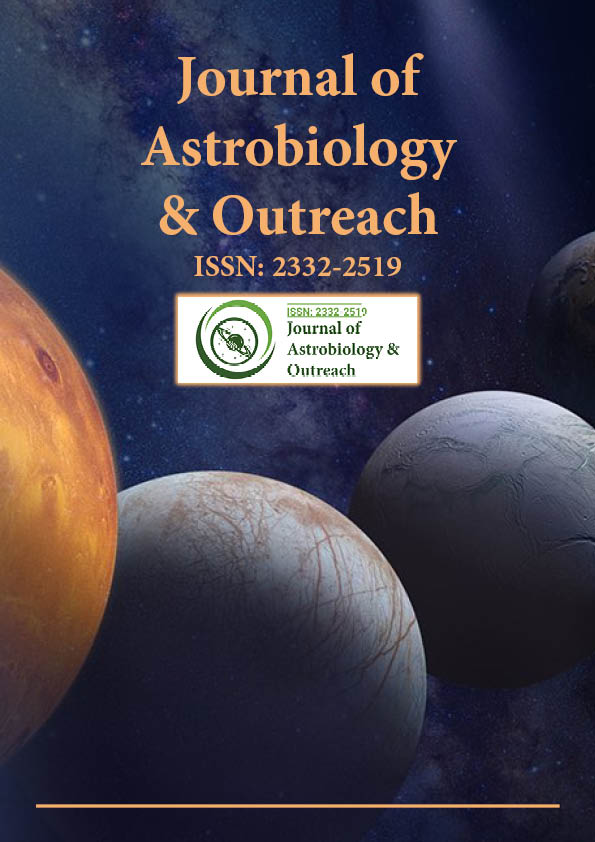Indexed In
- Open J Gate
- Academic Keys
- JournalTOCs
- RefSeek
- Hamdard University
- EBSCO A-Z
- OCLC- WorldCat
- Google Scholar
Useful Links
Share This Page
Journal Flyer

Open Access Journals
- Agri and Aquaculture
- Biochemistry
- Bioinformatics & Systems Biology
- Business & Management
- Chemistry
- Clinical Sciences
- Engineering
- Food & Nutrition
- General Science
- Genetics & Molecular Biology
- Immunology & Microbiology
- Medical Sciences
- Neuroscience & Psychology
- Nursing & Health Care
- Pharmaceutical Sciences
Opinion Article - (2023) Volume 11, Issue 2
The Role of Astrophysical Sites in the Production of the Chemical Elements: Exploring Cosmochemistry
Rebecca Thombre*Received: 01-Mar-2023, Manuscript No. JAO-23-21063; Editor assigned: 03-Mar-2023, Pre QC No. JAO-23-21063(PQ); Reviewed: 17-Mar-2023, QC No. JAO-23-21063; Revised: 24-Mar-2023, Manuscript No. JAO-23-21063(R); Published: 31-Mar-2023, DOI: 10.35248/2332-2519.23.11.283
Description
Cosmochemistry is a field of study that examines the chemistry of the universe, its origins, and its evolution. It is a branch of astronomy and astrochemistry, and is closely linked to cosmology. Cosmochemistry is also closely related to astrobiology, which is the study of the origin, evolution, distribution, and future of life in the universe. Cosmochemistry is concerned with understanding the origin and composition of the universe, as well as its evolution over time. In particular, cosmochemists study the elements that make up the universe, and how they have been distributed and changed over the course of time. Cosmochemists also study the chemical processes that occur in the universe, such as nuclear reactions, stellar formation, and planetary formation. The study of cosmochemistry is important for understanding the universe and its evolution, as well as for making predictions about the future of the universe. Cosmochemists use their findings to help inform research in astronomy, astrobiology, and other related fields. Cosmochemistry is also important for understanding how planets form and how life may have originated in the universe. Cosmochemistry is an exciting and ever-evolving field of study. It is an essential part of developing our understanding of the universe and its components, and its findings can help us to better understand and explore our universe.
The universe is composed of a variety of chemical elements, all of which contribute to the formation and evolution of galaxies, stars, and planets. Cosmochemistry is the branch of science that studies the chemical elements and their abundance throughout the universe. In this article, they’ll explore the basics of cosmochemistry and how it helps us to identify the fundamental chemical elements in the universe. When it comes to cosmochemistry, the most important element to consider is hydrogen. Hydrogen is the most abundant element in the universe and makes up about 75% of its mass. In addition to hydrogen, there are a few other elements that are also found in large quantities throughout the universe. These include helium, oxygen, carbon, and nitrogen. The abundance of these elements is not uniform throughout the universe, however, some regions of space, such as the center of galaxies, are much richer in hydrogen and helium, while other regions are made up of more complex elements such as oxygen, carbon, and nitrogen. In order to understand the chemical composition of the universe, cosmochemists must study the abundance of different elements in different regions. The abundance of elements in the universe can also tell us something about the conditions in which they formed. For example, certain elements are only formed under very specific conditions, such as extremely hot and dense environments. By studying the abundance of elements throughout the universe, cosmochemists can gain insight into the formation and evolution of galaxies, stars, and planets. Cosmochemistry is an important field of study for understanding the evolution of our universe. By studying the chemical elements and their abundance in different regions of space, they can gain a better understanding of the formation and evolution of the universe.
As they explore the universe, it is important to understand the processes that are responsible for the formation of its chemical elements. Cosmochemistry is a field of scientific study that focuses on the origin of the various elements found in the cosmos. The formation of elements is a complex process that involves many types of interactions. The most common process is nucleosynthesis, which occurs in stars and involves the fusion of two atoms to form heavier elements. Over time, these elements spread out and can eventually become part of the interstellar medium, where they can be found in interstellar clouds, star-forming regions, and other astronomical objects. In addition to nuclear fusion, other processes are responsible for the formation of elements. These include cosmic ray spallation, which occurs when high-energy particles in space interact with the interstellar medium and form new elements. Supernovae are also thought to play a role in the formation of elements, as they generate powerful shock waves that can cause atoms to fuse and form new elements. Finally, chemical reactions in stars and between stars can also lead to the formation of elements. For example, when stars collide, they can release huge amounts of energy that can cause atoms to fuse and form heavier elements. Understanding the processes involved in the formation of the chemical elements is an important part of cosmochemistry. By studying these processes, scientists can gain a better understanding of the origins of the various elements in the universe, and how they have evolved over time.
Citation: Thombre R (2023) The Role of Astrophysical Sites in the Production of the Chemical Elements: Exploring Cosmochemistry. J Astrobiol Outreach.11:283.
Copyright: © 2023 Thombre R. This is an open-access article distributed under the terms of the Creative Commons Attribution License, which permits unrestricted use, distribution, and reproduction in any medium, provided the original author and source are credited.

